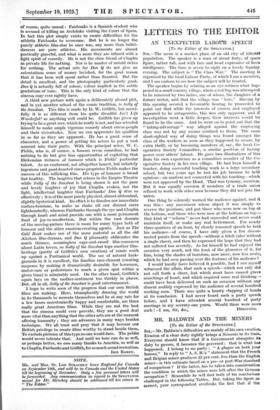LETTERS TO THE EDITOR
AN UNEXPECTED LABOUR SPEECH
[To the Editor of the SPECTATOR.] Sm,—The scene is a market place of an old city of 120,000 population. The speaker is a man of about forty, of spare figure, rather tall, and with face and head expressive of keen intelligence. The time is seven to eight on a lovely Sunday evening. The subject is " The Class War." The meeting is organized by the local Labour Party, of which I am a member, and I am curious to see how the subject will be treated.
The speaker begins by relating as an eye-witness what hap- pened in a small country village, where a red flag was attempted to be removed by two ladies, one of whom, the daughter of a former rector, said that the village was " hers." Having by this opening secured a favourable hearing he proceeded to point out that while the interests of owners and employed appeared to be antagonistic, this was only apparent, and if investigation went a little deeper, their interests would be found to be the same. And he went on to point out that the " taking-advantage " way alleged against the employing class was not by any means confined to them. The same short-sighted way of doing things was found amongst the class of the workers as soon as they happened to secure, by extra thrift, or by becoming members of, say, the local Co- operative Society Committee, a similar position of having power over others' labour. He gave two illustrations of this from his own experience as a committee member of the Co- operative Society in his own village. He had been himself a teacher, doing successful teaching work in a large secondary school, but two years ago he lost his job because he held opinions—on matters net connected with his teaching—which were not approved by the Head. That was tyranny, coercion. But it was equally coercion if members of a trade union refused to work with other men because they did not join the union.
One thing he solemnly warned the audience against, and it was this : any movement whose object it was simply to reverse the positions, and put those who were now on top at the bottom, and those who were now at the bottom on top— that kind of " reform " never had succeeded and never could Maintain itself, or make any real betterment. For nearly three-quarters of an hour, by closely reasoned speech he held his audience—of course, I have only given a few discon- nected points from the speech—without a hitch (also without a single cheer), and then he expressed the hope that they had not suffered too severely. As for himself he had enjoyed the occasion very much, not the least of the pleasures of it, for him, being the shades of boredom, now more, now less acute, which he had seen passing over the features of his audience I
I would hardly have believed it possible, had I not myself witnessed the affair, that such a speech—which not only did not call forth a cheer, but which must have caused grave searchings of heart, and which required some real thinking— could have been delivered on such an occasion without any dissent audibly expressed by the audience of several hundred working men. There was quite a hearty clapping of hands at its conclusion. I had never heard such a party speech before, and I have attended several hundred of party meetings in my seventy-one years, Would there were more










































 Previous page
Previous page